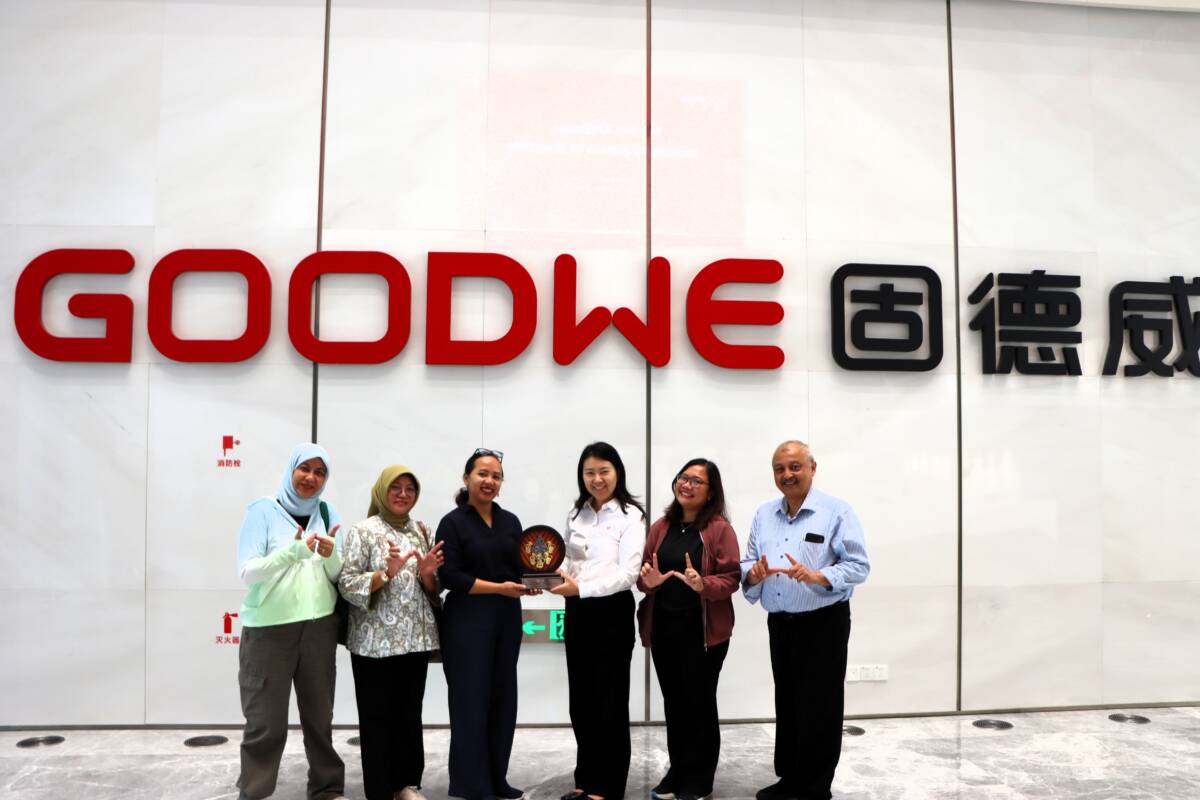Suzhou, June 14, 2025 – China has a variety of technological innovations and renewable energy project initiatives, one of which is carried out by GoodWe. GoodWe is a world-leading solar inverter manufacturer and smart energy solution provider listed on the Shanghai Stock Exchange. GoodWe has nearly 5,000 employees worldwide and has worked on solar power installations in more than 100 countries and regions.
The Indonesian delegation led by the Institute for Essential Services Reform (IESR) visited GoodWe on Saturday (6/14), to continue the series of 75 Years Indonesia–China Exchange Visit programs that took place from June 10-14, 2025. The journey to GoodWe took about 30 minutes from the delegation’s accommodation in Suzhou. Upon arrival at the location, the participants were warmly welcomed by the GoodWe team, which was the beginning of an open dialogue on clean energy technology innovation and collaboration opportunities between the two countries.
Grace Wang, General Manager of International Strategic Business Department, GoodWe stated that amid the increasing urgency of climate action and global industrial transformation, the company is introducing a revolutionary approach to factory management through the development of the Zero-Carbon Factory. This concept not only addresses environmental challenges, but also offers a model for a future industry that is economically, socially, and ecologically sustainable.
“Zero-Carbon Factory is an initiative that integrates renewable energy projects such as solar power installations and energy storage systems into factory operations. This step is in line with the global trend of environmental protection, while also proving that sustainability can go hand in hand with industrial productivity and competitiveness,” said Wang.
Not only that, according to Wang, from an economic perspective, the implementation of such projects can significantly reduce energy costs and open up new jobs, especially in the green technology and renewable energy sectors. This is a concrete solution for the industry to continue to grow without increasing the carbon footprint.
“Socially, the existence of a zero-carbon factory can also strengthen the company’s image. By demonstrating environmental responsibility through real actions, companies like ours not only improve their reputation in the eyes of consumers, but also build trust with business partners and global stakeholders,” said Wang.
Meanwhile, in terms of the environment, Wang continued, the use of clean energy and emission reduction are real proof that sustainability can be implemented on a large scale. The Zero-Carbon Factory reflects a commitment to maintaining the sustainability of the planet, while also showing that the energy transition is something that can be achieved with will and innovation.
“The Zero Carbon Factory facility is built in Guangde Phase III Campus, with one of the flagship buildings called “Zero-Carbon Cabin”, a sophisticated pavilion used as a demonstration and education center. This is where environmentally friendly innovation and technology are displayed as part of GoodWe’s long-term vision to present an industry that is not only efficient, but also ecologically responsible,” said Wang.
During this visit, the Indonesian delegation also saw the application of EcoSmart Home technology. This concept is designed to revolutionize the way households use, store, and manage energy, all in one integrated system that is efficient and sustainable. EcoSmart Home is a series of solar-based technologies that offer various solutions from upstream to downstream, from electricity production, storage, to managing household energy consumption. Users can monitor their energy performance directly through the mobile application, such as daily electricity usage, power reserves, carbon dioxide saved, and solar panel energy production in real time.
“With this system, we provide answers to the need for more environmentally friendly and cost-effective energy, while providing full control for users to understand and manage their household electricity consumption. This technology is very relevant to be applied in various countries that are facing the challenge of the energy crisis,” said Wang.
Furthermore, Wang emphasized that his party has a wide operational network that includes three main production bases located in Suzhou and Guangde in China, and Hai Phong in Vietnam. There are also four research and development centers in Suzhou, Shenzhen, Wuhan, and Nanjing, as well as more than 20 subsidiaries and sales service centers including in Australia, Germany, the United States, Japan, South Korea, Brazil, Turkey, and South Africa.
“The existence of this wide network allows us to distribute innovations quickly and efficiently to various international markets, while adapting to the diverse energy needs and regulations in each country. With the combination “Bringing together green vision and the power of digital technology, we are not only offering products, but also building a future energy ecosystem,” said Wang.

